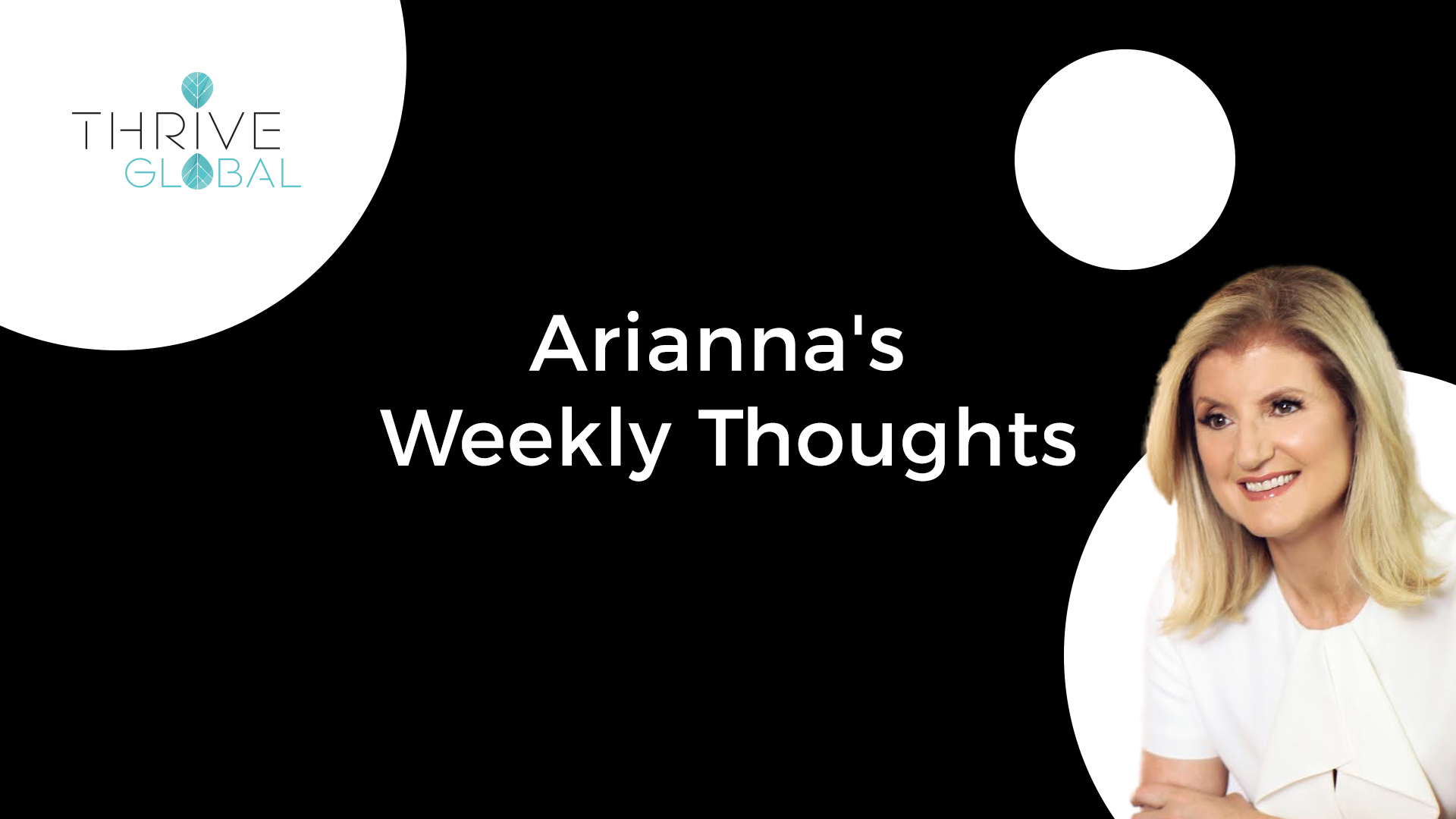In case you missed it, here’s the text of my new Weekly Thoughts newsletter. Each weekend I share my take on the week’s news stories, my favorite pieces on how we can thrive even in our stressful world, and some fun and inspiring extras. Subscribe here.
And if you haven’t already, be sure to subscribe to Thrive’s daily newsletter highlighting our favorite reads with actionable tips for enhancing your well-being, productivity, and sense of purpose.
***
Welcome to my first Weekly Thoughts Newsletter.
And what a week it was:
Spring, along with the cherry blossoms, is finally here, but Winter is Coming, and Game of Thrones fans are already trying to figure out how it will be going out.
The E.U. was asked for yet another Brexit extension by the U.K., and that’s OK — since at Thrive Global we know the science of how bad all-nighters can be.
We finally heard from members of the Mueller team, who were miffed that Attorney General Barr’s summary of their report apparently wasn’t so accurate (who could have predicted?). We don’t know who was leaking to the press, but perhaps it was the “oranges of the investigation” that the president said we need to find.
And Joe Biden led a public conversation about private space. The president’s response was predictably un-self-aware — the pot inappropriately grabbing the kettle by the…
***

At Thrive Global the week was all about going upstream to tackle the stress and burnout epidemic and the urgent need to redefine how we think about health and well-being. That was the theme of this year’s Fortune Brainstorm Health conference, which I co-chaired this week in San Diego.
An estimated — and astounding — 75 percent of our health care spending goes toward the treatment of chronic conditions, like heart disease and diabetes, that could be managed or even prevented with lifestyle changes. When you include mental health, it goes up to 90 percent. And yet in the U.S. our life expectancy has fallen three years in a row.
So instead of focusing our resources on costly downstream harm reduction and just treating symptoms, we need to go upstream to the root causes of the stress and burnout epidemic. That’s where we can have the most impact by helping people make lifestyle changes.
And the good news is, more and more businesses are doing just that, which was the topic of myfirst panel, “Corporate Makeovers: Reimagining Employee Health,” with Qualtrics co-founder Jared Smith, CEO of the California Public Employees’ Retirement System Marcie Frost, President of Americas and Asia Pacific Japan for SAP Jennifer Morgan, and Marvelle Co. CEO Marvelle Sullivan Berchtold. The discussion was about the benefits for companies of widening their definition of well-being beyond just health care. For example, as Jennifer said: “Wellness, yes, it’s about health. But wellness can be defined in many different ways, such as financial wellness.”
Day two I had a fantastic conversation with one of my favorite people, Dr. Lloyd Minor, Dean of the Stanford University School of Medicine. Lloyd has been at the forefront of what he calls precision health. Precision medicine is about getting personalized treatment based on your unique genetic makeup when you get a disease. Precision health, on the other hand, is about intervening upstream to prevent the need the treatment. As he put it, “to predict, prevent, and cure precisely.”
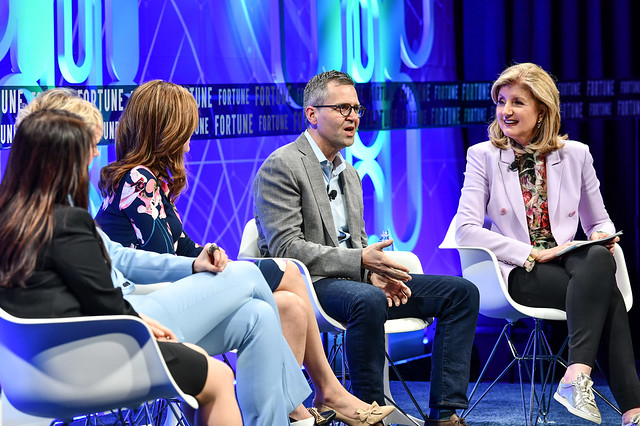
The conference was also the occasion for Thrive Global to unveil our Thrive XM Index, which we built along with a SAP and Qualtrics. It’s based on the truth that our lives are shaped by our experiences — the birth of a child, the death of a loved one, someone’s first leadership role or a promotion that requires them to relocate. These moments that matter are also often where the biggest pain points occur in the workplace. What the Thrive XM Index allows companies to do is go upstream, gain unprecedented insight into their people experience and support their employees in the full range of their lives. These actionable insights allow businesses to unlock the full potential of their people.
I closed the conference with a one-on-one conversation with one of my favorite actresses, the indomitable Edie Falco. She shared a vivid example of how these work and life (and sometimes life-and-death) issues intersect. In 2003, while shooting The Sopranos, she was told she was diagnosed with cancer. She was scheduled to be on set a few hours later. Which she was. “You go into some sort of hyper reality,” she said. “I remember exactly what scene we shot, and wanting to say what was going on, but also knowing I wasn’t going to tell anybody.” Fortunately, she’s since decided to tell her story. And it doesn’t stop there. After treatment, and going into remission, she decided to adopt a child. She talked to us about life as a single mom of two (she adopted another) and her practice of Buddhism. “We appear to be a species where ritual and meaning are important,” she said. “Everything we believe, we made a conscious decision to believe it.”
***
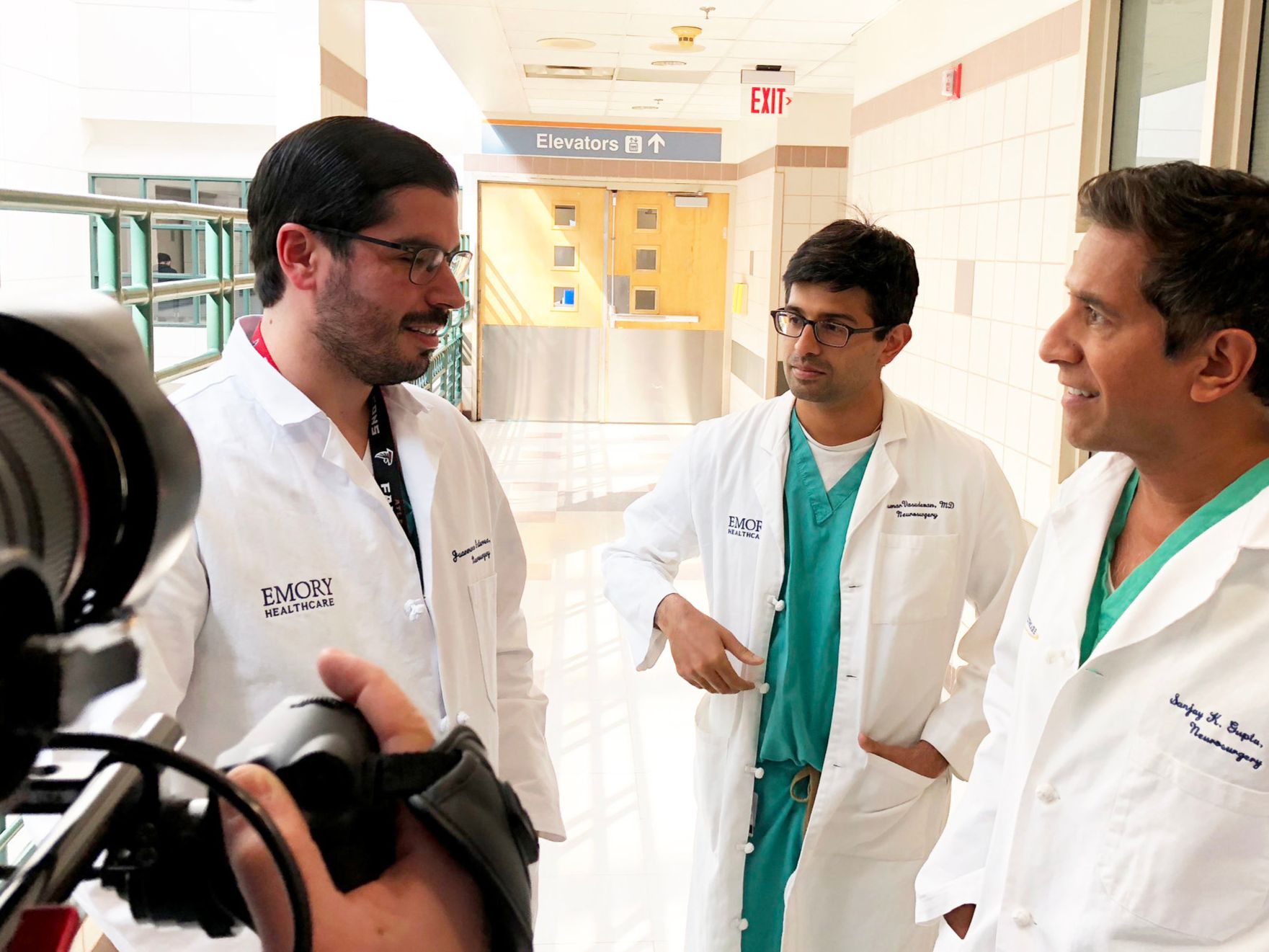
As those of you who follow me on social media know, I loved Dr. Sunjay Gupta’s HBO documentary One Nation Under Stress. The film is an attempt to find out why, even as health care costs are soaring, our life expectancy rates are falling and “deaths of despair,” an aptly grim new term of our modern world, are climbing. I highly recommend it.
If the intersection of work and life is making you stressed, as it is for most people, here are some great ways to leave your stress and work and not bring it home with you. My favorite, “schedule a post-work mini-transition.”
Email, one of the main sources of stress, was in the news this week, as Google officially shut down its Inbox app. This caught entrepreneur and author Damon Brown by surprise. He discovered it while on the road, which made him unable to get his email. What at first seemed like disaster turned into epiphany, as he realized how much more productive he was without email on his phone. “The focus became writing down my business strategies, being more present for my family and, most importantly, cooling my obsession with checking on responses,” he writes. “Email puts you in reaction mode. Success comes from initiating. The best entrepreneurs I know put this into practice, and removing your email app is a good start.”
And if time management is a struggle for you, maybe that’s because, as Wharton professor Adam Grant says, you’re too focused on managing your time, instead of what’s really at issue: your attention. Here are some tips from experts for managing our limited, though renewable, resource of attention.
***
In Oprah’s new book, The Path Made Clear: Discovering Your Life’s Direction and Purpose, she tells a story about the importance of paying attention to the goals and talents of your people. At her first job, as a news anchor, she felt out of place. So much so that she was “demoted” to hosting a talk show. On the first day, after interviewing soft serve ice cream inventor Tom Carvel, she knew what she wanted to do. “When the hour ended, there was a sense of knowing resonating within my heart and radiating to the hairs on the back of my neck,” she writes. “My entire body told me this is what I was supposed to do. There was no doubt that the seeds of what was to give my life meaning and purpose had been planted.” So what was thought to be soft news, interviewing a soft ice cream maker, bloomed into a life of giving purpose and meaning to millions of others.
***
Before You Go
The week kicked off on April Fools’ Day, which reminded me of this quote:
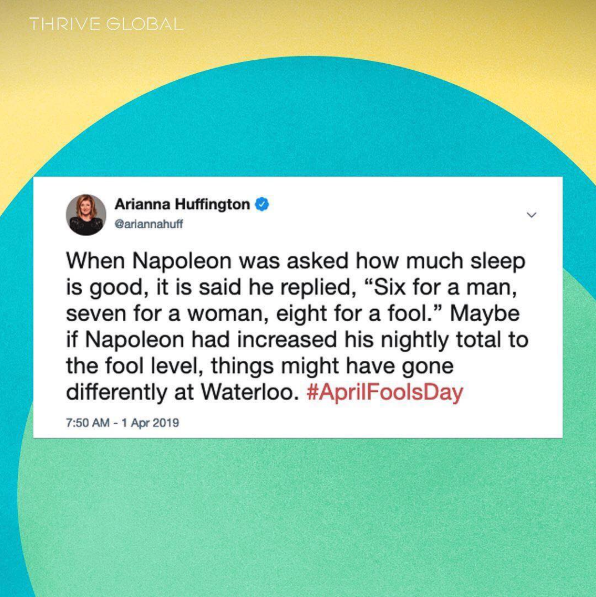
To arm yourself for next year, make sure and get some sleep on March 31st. As studies show, sleep deprivation results in an increase of “magical thinking,” which just makes it easier for the pranksters in your life. So if you fell for any pranks this year, maybe you need to get to the “oranges” of the problem. To borrow from another former commander-in-chief, “Fool me once, shame on me, fool me twice, I should get some sleep.”
And this week, I thought about Maya Angelou on what would have been her 91st birthday. Here is one of my favorite quotes from her:
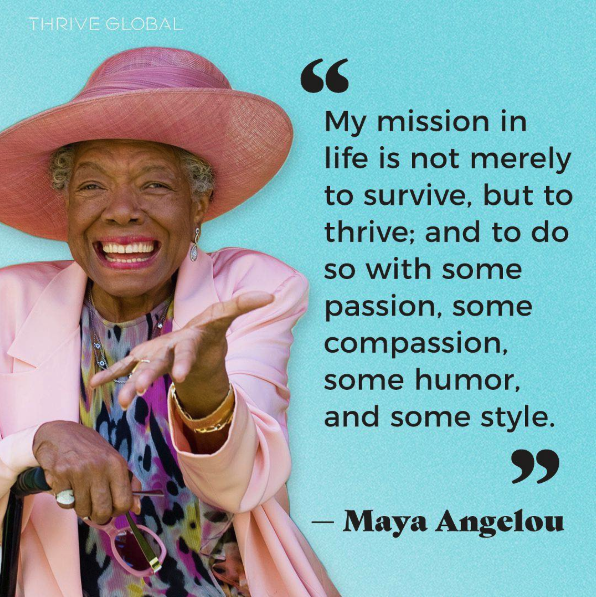
Subscribe here for my Weekly Thoughts Newsletter, where you’ll find my take on the week’s news, my favorite pieces on how we can thrive even in our stressful world, and some fun and inspiring extras.


